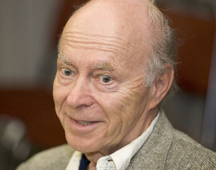 Nobel Prize winner Irwin Rose, Ph.D., will visit UNMC on April 24 as the Department of Biochemistry and Molecular Biology’s student-invited speaker.
Nobel Prize winner Irwin Rose, Ph.D., will visit UNMC on April 24 as the Department of Biochemistry and Molecular Biology’s student-invited speaker.
Dr. Rose shared the 2004 Nobel Prize for Chemistry with Aaron Ciechanover and Avram Hershko, both of the Israel Institute of Technology, Haifa, Israel, “for the discovery of ubiquitin-mediated protein-degradation.”
On April 24, Dr. Rose, now a professor emeritus of physiology and biophysics at the College of Medicine, University of California, Irvine, will present “Adventures in Biochemistry: Days I’m glad I came to work” at 1 p.m. in the Durham Research Center Auditorium.
“We’re excited to host a person of Dr. Rose’s stature,” said Wade Junker, the biochemistry department student representative who invited Dr. Rose to campus. “As students, we need to know where the frontier of research is moving and Dr. Rose has been instrumental in shaping the frontier in biochemistry.”
All living things – plants, animals and humans — are built of proteins. In the late 1970s, biochemists knew a lot about how the cell produces proteins, but in the early 1980s, Drs. Rose, Ciechanover and Hershko “went against the stream” and discovered one of the cell’s most important cyclical processes, regulated protein degradation.
The trio’s knowledge shaped thought on how the cell can regulate the presence of a certain protein by marking unwanted proteins with a label consisting of the polypeptide ubiquitin. Proteins so labeled are then broken down – degraded – rapidly in cellular “waste disposers” called proteasomes.
Their groundbreaking discovery made it possible to understand at a molecular level how the cell controls a number of important biochemical processes such as the cell cycle, DNA repair, gene transcription and quality control of newly-produced proteins. New knowledge of this form of controlled protein death also has contributed to explaining how the immune defense functions. Defects in the system can lead to various diseases including some types of cancer.
A native of New York, Dr. Rose earned his bachelor’s degree in 1948 and his doctorate degree in 1952 in biochemistry from the University of Chicago.
UNMC biochemistry students ranked Dr. Rose as their top choice while brainstorming whom to invite to their annual student-invited speaker seminar. Junker e-mailed Dr. Rose and within days got a reply.
“I was amazed,” Junker said. “Sometimes you get lucky. Everyone was pretty blown back when I told them he was coming.”